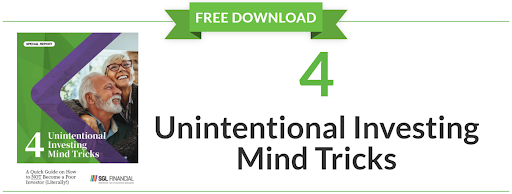Long-Term Investing is a Way to Overcome Short-Term Market Stress
by Gabriel Lewit

Think of a long-term investing strategy like planting a tree. Just as a sapling needs time, care, and the right conditions to grow into a sturdy, fruit-bearing tree, your investments require patience, consistent contributions, and the right mix of asset classes to mature into a robust portfolio. You don’t plant a tree expecting immediate shade or fruit; with investing, the real benefits are seen over the years, not days, weeks, or a few months. As the pundits say: “It’s a marathon and not a sprint.”
Instead of focusing on short-term market fluctuations, a long-term approach emphasizes holding onto investments, like stocks, bonds, and other types of investments, through various market ups and downs. The idea is that, over time, markets generally produce positive returns, so staying invested for the long haul makes you less likely to move money in and out of markets based on whims.
While this may sound rational and easy to maintain, keeping a long-term focus in volatile markets can be challenging and stressful. And, the more volatile the markets, the more self-induced stress impacts investors. It can be difficult to maintain your composure when everyone around you is questioning their investment strategies and the market value of your retirement savings is declining each month.
Read Our Recent Guide: Navigating Market Volatility: The Power of Long-Term Investing
We’ll describe five strategies to help you temper any potential anxieties you may experience due to short-term market volatility.
Dollar-Cost Averaging (DCA)
Dollar-cost averaging is a strategy that can ease the worries you might have about timing your investments in the securities markets.
Imagine this: instead of trying to guess the best time to buy stocks or mutual funds, you invest a fixed amount of money at regularly scheduled intervals. This could be monthly, for instance. What happens then?
When the stock market is up, your fixed investment amount buys fewer shares, but when the market is down, that same amount buys you more shares. Over time, this approach can reduce a particular investment’s average cost per share.
The beauty of dollar cost averaging is that it takes the guesswork out of investing. You don’t need to worry about buying at the ‘perfect’ time. By investing regularly, you’re also likely to purchase more shares during market dips, which can increase your returns in the long run.
This consistent approach can be a calming factor, especially when the market is volatile. It’s about making steady, disciplined investments and not trying to predict future market movements, which can be stressful when you are wrong.
Watch our founder, Steve Lewit, discuss the impact of credit card debt.
Understand Your Emotions
Recognizing the impact of emotions like fear, greed, and anxiety on your investment decisions is crucial for making rational choices. Fear, exacerbated by the media, often surfaces during market downturns, causing emotional investors to sell investments – even in good companies with solid financials.
However, knee-jerk reactions to market movement usually don’t work because investors are getting out of the market after the damage has been done. Conversely, greed can lead to taking excessive risks in pursuit of higher returns, especially when markets are performing well. This can result in overexposure to certain investments or sectors of the economy, which creates an imbalance that is risky.
Impatience is another emotion that can impact your investment results. Seeking quick investment returns is common, but this can lead to frequent and unnecessary trading, potentially incurring higher costs and missing out on the benefits of compounding rates of return over longer periods of time.
Being aware of your emotions means acknowledging them when they arise and taking a step back to assess your decisions in a more objective manner. Remembering your long-term financial goals and considering whether your actions align with these objectives is the more rational approach.
Consulting with a financial advisor in Buffalo Grove who understands financial biases can help you maintain a steady course, even during volatile markets when emotions are running rampant.
Avoid Fear of Missing Out (FOMO)
Emotional buying and selling of investments is often driven by a fear of missing out (FOMO), which can significantly impact your financial well-being. When investors hear about a particular investment that is performing well, there is the temptation to jump on the bandwagon. However, it pays to remember that future performance may be different from past performance.
This impulse is rooted in the fear of missing out on what appears to be the proverbial sure thing. However, this approach often needs to look more into the fundamentals of investing, including the importance of a diversified portfolio and the risks associated with a concentration in one investment.
If you are susceptible to emotional decision-making without a long-term strategy, you should inject some discipline into your process by hiring an experienced financial advisor in Buffalo Grove.
When investment decisions are based on the short-term highs and lows of the market rather than a well-thought-out, disciplined plan, the result is often an unbalanced portfolio that doesn’t align with your long-term goals and risk tolerance.
The better approach is to stick to your long-term investment strategy. This strategy should be based on thoroughly understanding your current circumstances, financial goals, time horizon, and risk tolerance.
Focusing on your long-term objectives and resisting the urge to react to short-term market fluctuations makes you more likely to make decisions that align with your long-term financial goals. Remember, consistent and disciplined investing, free from emotional bias, is key to pursuing your financial goals.
Why SGL Financial Should Be Your Go-To Advisor for Investment Management Services
As an independent registered investment advisor located in Buffalo Grove, IL., we have a fiduciary duty to do what is best for our clients. We are successful when our clients are successful.
When helping you manage your wealth, we don’t view our relationship based solely on the numbers in your statements.
Our unique approach, the Four-Pillar Retirement Plan™, takes a detailed look at your financial goals. Then, we develop a long-term investment strategy that protects and nurtures what you’ve worked hard to build over the years.
Are you currently retired and thinking about ways to preserve your current financial security or are you just getting started accumulating assets for your retirement years? Either way, why not chat with a financial professional at SGL? Our team is focused on helping people like you achieve comfortable lifestyles and financial security later in life when they need it the most.
There are many different strategies, and our experts have access to best-in-class financial planning tools and data to help guide you on your journey. Remember, it’s never too late to start planning your financial future.
And if you’re unsure, have questions, or just want someone to double-check your plans, we’re always ready to lend a hand.

